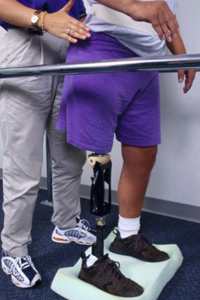Physical Therapy Helps Amputees Lead Fuller Lives

An estimated 199,000 people in the U.S. were using artificial limbs in 1994, according to the National Center for Health Statistics.
The oldest known prosthesis, an Italian leg made out of copper and wood, dates back to 300 B.C. Heavy and often unusable devices like the first artificial leg have made way for today’s more efficient and attractive synthetic limbs.
In addition, orthotists, prosthetists and physical therapists now work together to ensure that amputees are comfortable with their prostheses and are able to lead fuller, more productive lives.
“Orthotists and prosthetists are experts in the fabrication of artificial limbs, and in the selection of materials,” said Nancy Lewis, ScD, PT, assistant professor of physical therapy in the School of Allied Health Sciences. “Physical therapists focus on a person’s recovery and functional capacities. Together, they can select the best biomechanical approach to facilitate the person’s functional recovery.”
School of Allied Health Sciences physical therapy students recently came to Lubbock from Amarillo and the Permian Basin to participate in a hands-on physical therapy seminar focusing on prosthetics and orthotics.
Brian Loyd, a second-year physical therapy student, said he and his classmates learned how to mold thumb splints, form foot casts and tried on some older-model prosthetics, typically made of wood and polyester resins.
“Trying on the old prosthetics gave me a good understanding of how uncomfortable these devices are and an appreciation of what patients must go through when wearing them,” Loyd said.
New technology has made prostheses much more functional and more lifelike, Loyd said. The devices are stronger, lighter and easier to use. Prosthetic companies have also been pushing toward more electronic and computer-controlled devices.
“Use of these devices has been made easier, making the training done by the physical therapist more useful,” Loyd said.
Mark Stargel, 24, of Lubbock, has had a prosthetic leg since he was involved in accident at the 2006 Circle Track and Drag Boat Racing event at Buffalo Springs Lake. Sargel was sitting on a personal watercraft on the water’s edge when the driver of a speedboat lost control and hit him, breaking his right leg and badly damaging his left.
As a result, Stargel had his left leg amputated above the knee, and was fitted for a prosthesis. He was recently fitted with Ottobock’s C-Leg, a state-of-the-art prosthetic knee designed to allow the wearer to climb stairs more naturally.
Although he was already working with a physical therapist two to three times a week to regain strength in his right leg, Stargel said his physical therapist also helped him learn how to use his prosthetic left leg.
“Her expertise and genuine interest in my well-being gave me confidence and helped me learn to trust my prosthesis,” Stargel said. “I don’t know how people do it without physical therapy. I think it would be really hard.”
Related Stories
Celebrating Veterans: TTUHSC’s General Martin Clay’s Legacy of Service and Leadership
From his initial enlistment in the Army National Guard 36 years ago to his leadership in military and civilian health care management roles, Major General Martin Clay’s career has been shaped by adaptability, mission focus and service to others.
Texas Tech University Health Sciences Center School of Nursing Named Best Accelerated Bachelor of Science in Nursing Program in Texas
The TTUHSC School of Nursing Accelerated Bachelor of Science in Nursing (BSN) program has been ranked the No. 1 accelerated nursing program in Texas by RegisteredNursing.org.
TTUHSC Names New Regional Dean for the School of Nursing
Louise Rice, DNP, RN, has been named regional dean of the TTUHSC School of Nursing on the Amarillo campus.
Recent Stories
The John Wayne Cancer Foundation Surgical Oncology Fellowship Program at Texas Tech University Health Sciences Center Announced
TTUHSC is collaborating with the John Wayne Cancer Foundation and has established the Big Cure Endowment, which supports the university’s efforts to reduce cancer incidence and increase survivability of people in rural and underserved areas.
TTUHSC Receives $1 Million Gift from Amarillo National Bank to Expand and Enhance Pediatric Care in the Panhandle
TTUHSC School of Medicine leaders accepted a $1 million philanthropic gift from Amarillo National Bank on Tuesday (Feb. 10), marking a transformational investment in pediatric care for the Texas Panhandle.
Texas Tech University Health Sciences Center Permian Basin Announces Pediatric Residency Program Gift
TTUHSC Permian Basin, along with the Permian Strategic Partnership and the Scharbauer Foundation, Feb. 5 announced a gift that will fund a new pediatric residency.
